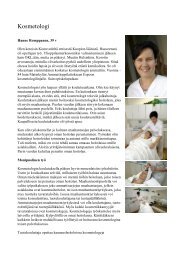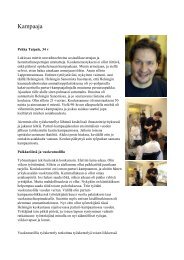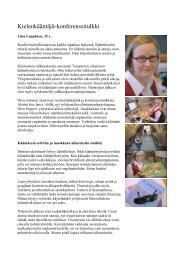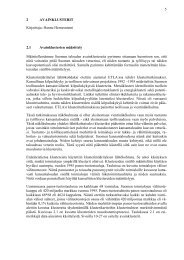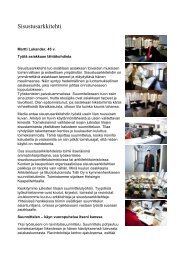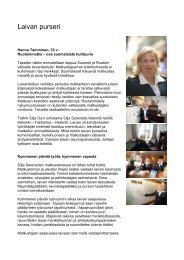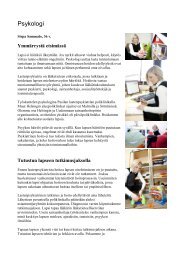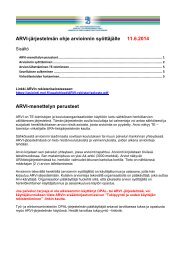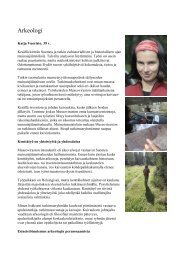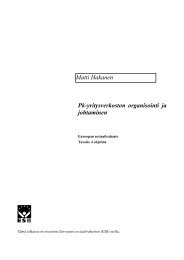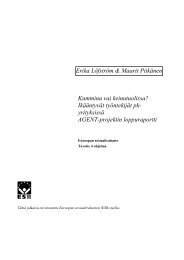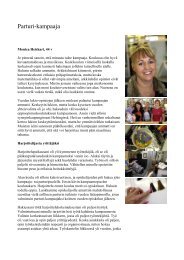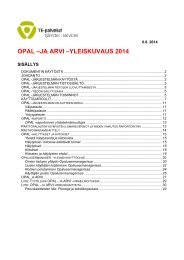Working Life Barometer in the Baltic Countries 2002 (pdf) - mol.fi
Working Life Barometer in the Baltic Countries 2002 (pdf) - mol.fi
Working Life Barometer in the Baltic Countries 2002 (pdf) - mol.fi
You also want an ePaper? Increase the reach of your titles
YUMPU automatically turns print PDFs into web optimized ePapers that Google loves.
198<br />
ised by way of <strong>in</strong>formation networks. Information flow<strong>in</strong>g via <strong>the</strong> Internet, for<br />
example, excludes a greater part of <strong>the</strong> population. Digital literacy is becom<strong>in</strong>g<br />
<strong>in</strong>creas<strong>in</strong>gly important <strong>in</strong> order for an <strong>in</strong>dividual to be a fully competent<br />
member of <strong>the</strong> modern <strong>in</strong>formation society. At <strong>the</strong> moment, <strong>the</strong> differences<br />
between countries as regards utilisation of <strong>in</strong>formation networks are huge, but<br />
<strong>the</strong> trend is <strong>the</strong> same everywhere: <strong>the</strong> importance of <strong>the</strong> networks is grow<strong>in</strong>g.<br />
For <strong>in</strong>stance Manuel Castells, who has done research on <strong>the</strong> development of<br />
<strong>the</strong> <strong>in</strong>formation society, divides citizens <strong>in</strong>to three groups: networkers, who<br />
clearly bene<strong>fi</strong>t from <strong>the</strong> change; flextimers, who struggle under <strong>the</strong> pressures<br />
of <strong>the</strong> change; and <strong>the</strong> jobless, who will often become elim<strong>in</strong>ated from <strong>the</strong> societal<br />
'competition'. Numerous o<strong>the</strong>r social scientists have also presented<br />
similar assessments of <strong>the</strong> <strong>in</strong>tensify<strong>in</strong>g polarisation among citizens that is concomitant<br />
with <strong>the</strong> spread of <strong>the</strong> <strong>in</strong>formation society. (See e.g. Lash 1995, Beck<br />
1999, Blom, Mel<strong>in</strong> & Pyöriä 2001).<br />
”Society became divided, as it was for most of human history, between w<strong>in</strong>ners<br />
and losers of <strong>the</strong> endless process of <strong>in</strong>dividualized, unequal barga<strong>in</strong><strong>in</strong>g.<br />
But this time <strong>the</strong>re were few rules about how to w<strong>in</strong> and how to lose. Skills<br />
were not enough, s<strong>in</strong>ce <strong>the</strong> process of technological change accelerated its<br />
pace, constantly supersed<strong>in</strong>g <strong>the</strong> def<strong>in</strong>ition of appropriate skills. Membership<br />
of corporations, or even countries, ceased to have its privileges, because<br />
stepped-up global competition kept redesigned <strong>the</strong> variable geometry of work<br />
and markets. Never was labour more central to <strong>the</strong> process of value-mak<strong>in</strong>g.<br />
But never were <strong>the</strong> workers (regardless of <strong>the</strong>ir skills) more vulnerable to <strong>the</strong><br />
organisation, s<strong>in</strong>ce <strong>the</strong>y had become lean <strong>in</strong>dividuals, farmed out <strong>in</strong> a flexible<br />
network whose whereabouts were unknown to <strong>the</strong> network itself.<br />
Thus, on <strong>the</strong> surface, societies were/are becom<strong>in</strong>g dualized, with a substantial<br />
top and a substantial bottom grow<strong>in</strong>g at both ends of <strong>the</strong> occupational structure,<br />
so shr<strong>in</strong>k<strong>in</strong>g <strong>the</strong> middle, at a pace and <strong>in</strong> a proportion that depend on<br />
each country’s position <strong>in</strong> <strong>the</strong> <strong>in</strong>ternational division of labour and on its political<br />
climate. But down <strong>in</strong> <strong>the</strong> deep of <strong>the</strong> nascent social structure, a more<br />
fundamental process has been triggered by <strong>in</strong>formational work: <strong>the</strong> disaggregation<br />
of labour, usher<strong>in</strong>g <strong>in</strong> <strong>the</strong> network society.” (Castells 1996, 278-279).




